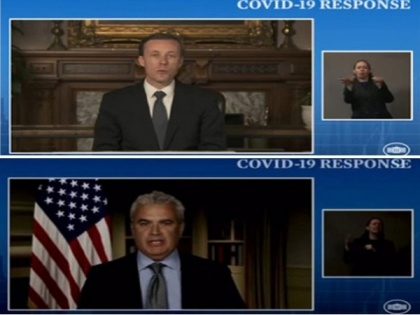US to use combination of Johnson & Johnson, Pfizer, Moderna in its global vaccine sharing effort
By ANI | Published: June 4, 2021 07:20 AM2021-06-04T07:20:07+5:302021-06-04T07:30:03+5:30
US will be using the combination of Johnson & Johnson, Pfizer and Moderna in its global vaccine sharing effort to fight against the COVID-19 pandemic.

US to use combination of Johnson & Johnson, Pfizer, Moderna in its global vaccine sharing effort
US will be using the combination of Johnson & Johnson, Pfizer and Moderna in its global vaccine sharing effort to fight against the COVID-19 pandemic.
White House COVID-19 response coordinator Jeff Zients in a press briefing on Thursday (local time) said, "AstraZeneca doses -- the 60 million AstraZeneca doses -- are awaiting FDA concurrence. So, the 25 million will be comprised of the three approved -- EUA-approved authorized vaccines -- some combination of Johnson & Johnson, Pfizer, and Moderna."
US is set to allocate the first tranche of 25 million COVID-19 vaccines globally to address potential surges and the needs of the most vulnerable countries affected by the pandemic, including India.
Responding to a question on the allocation of these vaccines through COVAX facility, National Security Advisor (NSA) Jack Sullivan said, "COVAX has a list of countries -- the doses that are allocated to each of those countries, and we, the United States, have made selections against that list in coordination with them so that we will retain the say in terms of where they go."
Regarding allocation of vaccines in African Union, Sullivan said, "We are sharing with the African Union, who will ultimately make -- be making the determinations about how to allocate within Africa."
"And in the case of the Caribbean, we'll be working closely with CARPHA, the public health authority in the Caribbean, who will be making some of the key determinations for where the doses are allocated," added Sullivan.
"But ultimately, the United States will have the authority to say, "The doses are going here, as opposed to there. But that will be done in very close consultation and partnership with COVAX and, crucially, according to COVAX's formula, and then using the COVAX logistics capacity and delivery capacity to ensure that these doses actually translate into shots in arms that helps save people's lives," added the NSA.
Meanwhile, Zients announced to share about 13 per cent of the vaccines produced for the US by the end of June with Korea.
"As I mentioned earlier, those doses (for Korea) are in flight now. We've announced plans to share about 13 percent of the vaccines produced for the US by the end of June. That's the most of any nation, and that's the 80 million. So, over the coming weeks, we'll work to get those doses to countries and get shots in arms as soon as possible."
US will also be working through logistics, like medical agencies, coordinating to ensure safety and regulatory information to share supply teams to ensure necessary needles, syringes, and alcohol pads; transportation teams to ensure proper temperature storage, prevent breakage, and ensure the vaccine immediately clears customs.
The process to export the first 25 million is underway in coordination with foreign governments.
"President Biden has committed, as we talked about earlier, to sharing 80 million doses by the end of June, and we will deliver on the President's commitment of 80 million doses by the end of June," added Zients.
The US decided to share at least 75 per cent of these vaccines through COVAX and 25 per cent in a flexible way.
Regarding the allocation of these 25 percent vaccines allocation in a flexible way, Zients stated, "We will lay out, more specifically, the precise destination of those. The judgment we make about where those go is a combination of where there are specific urgent situations where partner countries are facing crises. And so, some examples of that include -- a portion of those doses will go to India, which has, obviously, dealt with a surge.
"Some of them will go to the West Bank and Gaza, which has just, obviously, endured its own form of crisis over the course of the past month. And then there will be other destinations for the remaining doses, and we will lay that all out as those doses are prepared and then shipped," he said.
On the question of the source of the doses, whether they were coming from states' inventory or the pool of federal supply, Zients replied, "25 million doses -- are coming from the federal pool of supply. The doses that are at the states' level, those states have ordered those doses and we're working with those states to administer shots in arms so that the millions of Americans who are not getting vaccinated can get vaccinated as soon as possible."
Answering to "no strings attached" to these vaccines, Sullivan said, "United States is not asking anything of any country to whom we're giving doses. We're not seeking to extract concessions. We're not extorting. We're not imposing conditions, the way that other countries who are providing doses are doing. We are doing none of those things. These are doses that are being given -- donated free and clear -- to these countries for the sole purpose of improving the public health situation and helping end the pandemic."
Meanwhile, President Biden made a commitment to ensure that India received doses and giving them, not just an allocation under the regional portion of this, through COVAX, but an additional allocation from the US's discretionary portion, informed Sullivan.
( With inputs from ANI )
Disclaimer: This post has been auto-published from an agency feed without any modifications to the text and has not been reviewed by an editor
Open in app